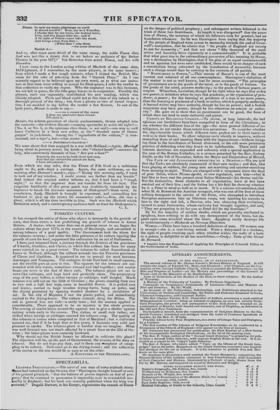SPECTABILIA.
LEARNED INACCURACIES.—The error of one man of name misleads many. Name had remarked on the Oceanct, that" Harrington thought himself so sure rf his general principle, that the balance of power depends on that of pro- puty,' that he ventured to pronounce it Impossible ever to re-establish mo- narchy in England ; but his book was scarcely published when the king was restored." Dugald Stewart, in his Essays, copecrates the remark of Hume
on the danger of political prophecy ; and subsequent writers followed in the track of these two Scotchrnen. At length it was discoiered* that the asser-
tion of Hume, the accuracy of which his followers took for granted, had no foundation whatever. So far was Harrington from saying that the majority of the people of England were averse to monarchy towards the end of Crom- well's usurpation, that he admits that "the people of England are twenty to one for monarchy ; " and that not above " fifty thousand of the more active and knowing drive vigorously at a commonwealth." It is probable that what gave rise to the extraordinary perversion of his meaning by Hume, was a declaration by Harrington, that if his plan of an equal commonwealth and an agrarian law were once established, there would be no danger of such a constitution being subverted by the introduction of monarchy, because such a change would then be contrary to the interests of all parties. " KNOWLEDGE IS POWER."—This maxim of Bacon's is one of the most current and admired of all our commonplaces. Harrington's definition of the matter is not so well known, but far more accurate. "The principles of government are in the goods of the mind, or in the goods of fortune. To the goods of the mind, answers authority; to the goods of fortune power, or empire. Wherefore, Leviathan, though he be right when he says that riches are power, is mistaken when he says that prudence, or the reputation of pru- dence, is power; for the learning or prudence of a man is no more power, than the learning or prudence of a book or author, which is properly authority. A learned writer may have authority, though he has no power; 'and a foolish magistrate may have power, though he has otherwise no esteem or autho- rity." He goes on to show that no government can be good, the form of which does not tend to unite authority and power. CANONS OF REcioious CHARITY.—To revise, at long intervals, the bad opinions our forefathers have been compelled to form of the Christians; to see whether the different bias of the age—the more general diffusion of in- telligence, do not render those tenets less pernicious. To consider whether the objectionable tenets which different sects profess are in their hearts as well as in their books. To allow religious sects silently to improve, without reminding them of and taunting them with the improvement—without bring- ing them to the humiliation of formal disavowal, or the still more pernicious practice of defending what they know to be indefensible. These mild and tolerant doctrines are expanded and enforced, with a special application to the case of the Roman Catholics, in a sermon preached by the Rev. Sydney Smith, on the 5th of November, before the Mayor and Corporation of Bristol. THE FATE OF THE JANISSARIES PREDICTED BY A DERVISE.—We are told that the Turks are absolutely enamoured of their new tactics ; and that, like boys playing at soldiers, the young men are marching and counter-marching from morning to night. Times are changed with a vengeance since the days of poor Selim, whose 1Vi tarn dgedit, or new regulation, cost him—what it had like to have cost the present stout Sultan Mahmoud—his throne and life But the Janissaries, those obstacles to all organization, have at last been smoked out of their hive ; and the Sultan has a fair field for showing whether he is a Peter in mind as well as in mood. It'is a curious circumstance, that when M. de Bonneval the Austrian renegado, who was one of the first of those military foreigners in the service of the Porte, who attempted to introduce European manituvres into an Ottoman corps, was teaching his recruits to face to the right and left, a Dervise, who was observing their evolutions, turned to some Janissaries, whom curiosity had brought together, and said, "They are preparing to do for you as Peter did for the Strelitzes."
By far the majority of sudden deaths, which are generally attributed to apoplexy, have nothing to do with any derangement of the brain, but de- pend upon some mischief about the heart. Apoplexy rarely destroys life so instantaneously.—Richards on Nervous Disorders.
Women.—There have been a hundred definitions of man. Of woman one is enough—she is t,a rout-loving animal. From a dairy-maid to a duchess, the sight of people crushing each other, whether within the walls of a barn or a palace, is delightful to all her sensibilities.— Croly ; Tales of the Great St. Bernard.
* Inquiry into the Expediency of Applying the Principles of Colonial Policy to the Government of India.


















 Previous page
Previous page